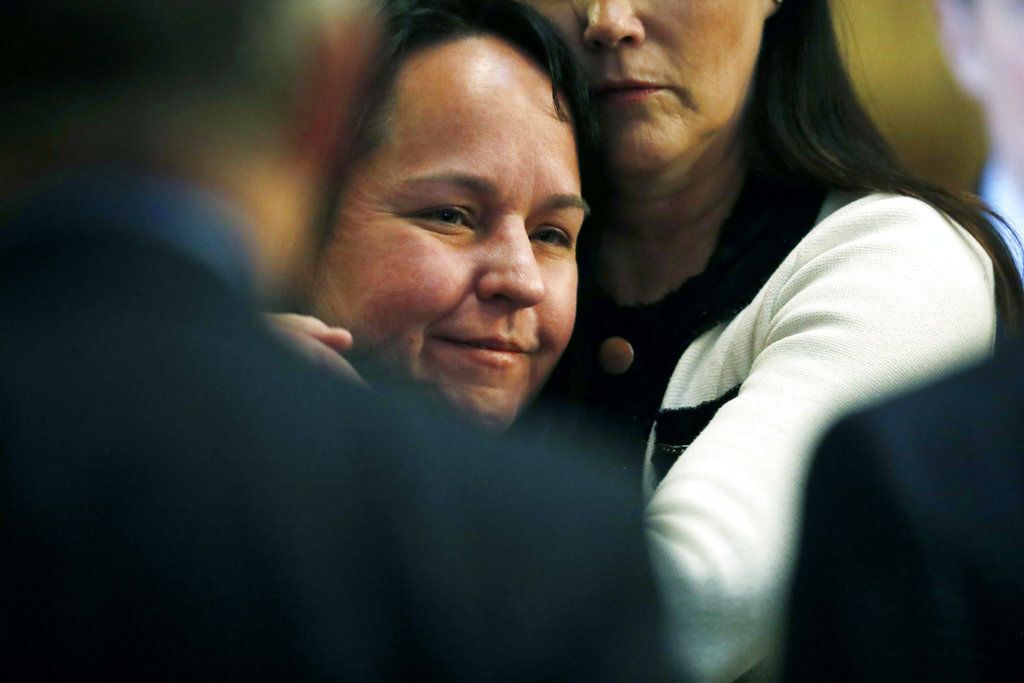Colorado lawmakers advance measure to bar vacancy appointees from immediately running for seats
A panel of House lawmakers on Monday approved a measure to bar candidates who reach the legislature through vacancy appointments from running in the next general election.
Four Democrats on the 11-member House State, Civic, Military & Veterans Affairs Committee reached their seats through vacancy appointments. Rep. Manny Rutinel of Adams County and Rep. Andrew Boesenecker of Fort Collins voted in favor of the measure; Rep. Kyle Brown of Lafayette and Chair Rep. Steven Woodrow of Denver voted against it.
Rutinel is running for his first election to his House seat in November.
House Concurrent Resolution 1004 seeks to address part of the problem stemming from vacancy appointments to the legislature — they create an incumbency for the seat, giving them an edge when the next election rolls around.
The resolution, which requires a two-thirds vote from the House and Senate to get on November ballot, asks voters to change the state constitution. It will need 55% approval from voters.
A Colorado Politics analysis in February showed that 28 lawmakers have won their legislative seats through vacancy appointments. For 24 out of the 28 current state lawmakers appointed by vacancy committees, fewer than 40 party insiders on average have made that pick, with a low of just four and a high of 95, both for Senate seats.
The Replacements: 28 lawmakers appointed to 29 seats by small groups of party insiders
The system has led to a handful of party insiders choosing who gets to represent hundreds of thousands of Coloradans. Democrats and Republicans have criticized the vacancy process, although some also argued it’s not ideal or practical
Given that a small group of party insiders picks a lawmaker’s replacement, some decry the system as “blatantly undemocratic.” Others maintain that while it’s imperfect, the alternatives are no better, and it’s important that a district gets immediate representation at the state Capitol, where policymakers work on legislation big and small in just 120 days.
Only five states — Colorado, Illinois, Indiana, New Jersey and North Dakota — allow party insiders to pick replacements when a lawmaker steps down.
“People outside who look in are losing trust and confidence in the system, and that is very dangerous,” State Rep. Robert Marshall, D-Highlands Ranch, told the state affairs committee.
He said the resolution is not intended as a “knock” on any lawmaker who reached the General Assembly through the vacancy process.
“But it is antithetical to a democratic system to have a small groups of people appointing those who will serve in the legislature and representing 88,000 to 125,000 with a number as small as nine people determining who that person would be,” he said.
Marshall noted that one argument favoring the current system is that the appointees are “ratified” by the vacancy committee’s decision in the next general election. Marshall said that instead of ratification, it could be a “rubber stamp because of the power of incumbency.”
Only five times in the past quarter century has a lawmaker who won a vacancy appointment not won a seat in the following election. That’s out of approximately 56 vacancies between 1998 and now, including the current 28.
Marshall is the only current lawmaker in the House who defeated a Republican lawmaker who won his seat through vacancy. Marshall unseated Rep. Kurt Huffman of Highlands Ranch after Huffman was appointed after the session ended in 2022 to fill out the remaining term of then-Rep. Kevin Van Winkle.
Winkle was appointed to fill out the term of Sen. Chris Holbert, R-Douglas County, who had stepped down.
Sen. Rachel Zenzinger, D-Arvada, was appointed to finish out the term of Sen. Evie Hudak, who resigned rather than face a recall in 2013. Zenzinger lost the 2014 election to Sen. Laura Woods, but came back in 2016 to defeat Woods in the rematch.
Three others have lost their attempts to win the seats they initially got through the vacancy process.
Rep. Alexander “Skinny” Winkler, R-Adams County, filled out the last 44 days of the 2018 legislation session for Rep. Steve Lebsock, who changed his party affiliation from Democratic to Republican the day he was expelled from the House for sexual harassment of a half-dozen women, including then-Rep. Faith Winter, D-Westminster. Winkler lost his bid for the seat in the 2018 general election.
Sen. Jean White, R-Winter Park, served out the last two years of the term of her husband, Sen. Al White, who resigned to work for the Hickenlooper administration in 2011.
Sen. Bryan Sullivant, R-Evergreen, was appointed to replace Sen. Tony Grampsas, R-Golden, who died in February 1999 after winning his first term in the Senate. Sullivant lost the 2000 election to Sen. Joan Fitz-Gerald, D-Genesee.
“The power of the incumbency has really been the issue of increasing the number of incumbents that are creeping up into the system,” Marshall said.
Marshall said the gold standard is a special election.
At least one ballot measure is working its way through the process that would require one for a vacancy.
But special elections are expensive and not particularly efficient, given a 120-day legislative session, Marshall said.
The resolution does not bar someone appointed through the vacancy process from running for the seat in future years, and Marshall said he believes that vacancy appointment would not count against term limits.
He suggested that former lawmakers, lobbyists, aides or other “policy wonks” who don’t want to get involved in general election politics might serve an unexpired term.
The hearing drew no witnesses either for or against the measure. Marshall said that, although he’s been talking about the issue all session, including with Colorado Politics, once it was introduced, he had reached out to “good government” groups. Given the resolution had only been introduced on April 11, none likely had time to obtain their board’s positions, he said.
Brown — who gained his seat from a vacancy committee after Rep. Tracey Bernett, D-Louisville, resigned at the start of the 2023 session in a plea deal over living outside her district — told Marshall that had Marshall’s system been in place, Brown’s district would have had a “seat filler” for two years and that many people would not have run.
Pointing to the Marshall fire just weeks before his appointment, Brown said he believed a “seat filler” would not have worked as hard.
“I don’t think this would have served my community,” Brown said.
Rep. Jenny Willford, D-Northglenn, also a “no” vote, said she worries about who could serve in those shorter stints in office. She would not have been willing to give up her job to serve for six months, she said, and she surmised lots of other people would feel the same. Only those who would be financially able, such as wealthy or retired people, would likely fit that role, she said.
Boesenecker said he doesn’t think the vacancy process is broken, but he said it’s a worthy conversation for the House.
There’s also an issue around transparency on donations — Boesenecker noted those who run for vacancies but not the general election are not required to disclose their donors.
“I think we owe it to the public to have that conversation in a public way,” he said, in voting in favor of the measure.











